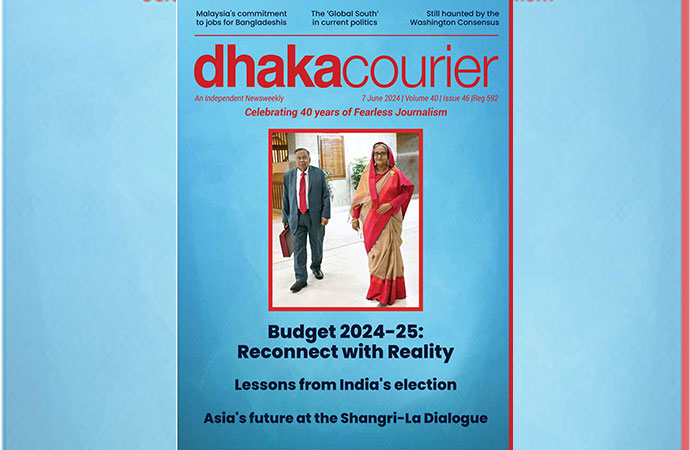Nature

Courtesy
Rivers globally face imminent threats, exacerbated by the escalating urbanization that consequently expands the water footprint of cities. As urban populations burgeon, water-stressed cities are contemplating the utilization of environmental flows as a prospective water source. In the impending deliberations over water policy, where the vitality of rivers clashes with the human entitlement to water, it becomes imperative for rivers to be endowed with a resolute and efficacious advocacy to assert their interests in these discussions.
Integrated water resource management necessitates a unified and cooperative strategy for water utilization, fostering collaboration among diverse users. The essential foundation of the human right to water relies on the preservation of robust, operational aquatic ecosystems that ensure the provision of secure freshwater resources.
The global movement advocating for the acknowledgment of legal rights for rivers is fundamentally rooted in the interplay between human communities and their geographical surroundings. This movement aims to reconcile human water rights with the need for environmental flows in emerging water reserves, safeguarding them from potential exploitation for commercial water needs in the future. However, can this cooperative strategy be viable in situations where rivers are viewed as adversaries, possessing their own legal rights?
As more rivers globally are granted legal rights and acknowledged as legal entities, a crucial question arises: what implications arise for water law and governance when the natural environment is legally recognized as a subject? The response reveals an unexpected and noteworthy paradox: while endowing the environment with legal standing introduces new legal capacities and is often vital for substantial advancements in environmental outcomes within water rights and markets, it may paradoxically weaken the cultural narrative that deems environmental protection essential.
Understanding the implications of granting legal rights to rivers poses a pressing challenge for water resource management and environmental law. By affording rivers legal personhood, the law acknowledges them as entities with enforceable rights. This raises the question of whether such recognition fosters collaboration and partnership between humans and rivers or positions rivers as additional contenders for limited resources. A comprehensive assessment is needed to grasp the consequences of conferring legal rights and personality to rivers, particularly in situations where competing water rights, such as those of irrigators, intersect with the imperative to maintain ecological health in water-scarce environments.
Here the paradox comes: giving legal rights to nature may increase its legal power, but in doing so it can weaken community support for protecting the environment in the first place.
Lessons from the new 'river persons', show how to use the law to improve river protection and how to begin to mitigate the problems of the paradox.
Some of the best evidence of using the legal person to build a collaborative approach to river health comes from Aotearoa New Zealand and Colombia, where the rivers received legal rights as part of a broader recognition of cultural values and the connection between people and the river.
In New Zealand, the Whanganui River attained legal recognition as a person, aligning with the Māori perspective that considers the river as an ancestral entity deserving care. Similarly, in Colombia, the Río Atrato was granted legal rights as part of a comprehensive initiative mandated by the Constitutional Court to safeguard the well-being of communities within the river basin. By aligning river rights with human values, these legal measures have become integral to the social, cultural, and economic fabric, avoiding the perception of rivers as potential rivals to humans and instead, weaving the destiny of the rivers into the intricate tapestry of human values.
India presents a compelling counterargument: the foundational underpinnings of legal rights are subject to intense controversy, given their derivation from Hindu religious principles while overlooking the myriad communities residing along the Ganga, whose lives and livelihoods are intricately linked to the river's well-being. While the state government's decision to challenge the High Court judgment does not explicitly cite this controversy, it undeniably eroded the prospect of garnering widespread community endorsement.
From the experience of Bangladesh, the principal governing body responsible for river management, the National River Conservation Commission (NRCC), encounters similar challenges in safeguarding rivers and water bodies. Over the past nine years of NRCC initiatives, no legal initiatives have been undertaken on behalf of any rivers in Bangladesh. Notably, the institution appears to be driven more by individual leadership motivations rather than adhering strictly to its prescribed charters. Furthermore, the NRCC contends with internal competition among various government bodies and grapples with insufficient coordination. This distinct model featuring a standalone apex body seems to foster a fragmentation of efforts, hindering collaboration among communities and civil society organizations in advocating for river conservation.
Furthermore, it is imperative that newly established legal entities are seamlessly integrated into the existing water governance framework.
The formulation of legal constructs within the realm of environmental law is fundamentally influenced by cultural narratives delineating the significance of the environment. These narratives wield considerable influence in shaping the regulatory approach to environmental challenges, as they tend to align specific constructs more proximately with either public interest or private interest theories of regulation.
Granting legal rights to rivers establishes them as legal entities, concurrently framing the aquatic environment as both a subject and an object within water law. In its capacity as a legal object, the aquatic environment is contingent upon the narrative that deems it deserving of protection yet legally vulnerable, necessitating human intervention for safeguarding. Conversely, in its role as a legal subject, rivers possess both legal rights and legal standing. Endowed with legal subjectivity, rivers attain a level of autonomy that diminishes their reliance on human guardianship, enabling them to initiate legal proceedings to uphold their own rights.
The conceptualization of the environment as a legal entity transcends mere physical dimensions; rather, it embodies a contingent and utilitarian construct shaped by human activities, societal values, and both legal and non-legal considerations. Consequently, the aquatic environment emerges as particularly susceptible to the oscillations within cultural narratives.
So, addressing the challenges of safeguarding rivers and achieving environmental water recovery lacks straightforward solutions. Balancing the preservation of the current industries and communities dependent on water usage with the imperative to sustain a thriving aquatic environment is a complex task.
The emergence of new entities, such as river persons, prompts a shift in the discourse from debating the legal recognition of the aquatic environment as a subject with rights and powers to exploring the practicalities of implementation. Notably, the legal rights paradox underscores the need for a closer examination of the mechanisms through which 'nature' is granted form and authority within legal frameworks.
Granting legal rights to rivers poses a formidable challenge to effective water governance. In the absence of adequate measures fostering the connection between communities and their natural surroundings, and the reinforcement of cultural values, the introduction of new legal rights for rivers may have unintended consequences. There is a risk that legal reforms aimed at affording rivers enhanced protections might inadvertently result in a weakening of such safeguards.
It is imperative for policymakers to articulate a clear understanding of the role that these newly designated legal entities will assume in the realm of water governance. The notion of providing rivers with a 'voice' becomes pertinent only when there is an expectation that they will actively compete for their own outcomes. However, this approach could be construed as an evasion of our responsibilities in environmental protection, as it implies a reliance on rivers to autonomously safeguard their well-being.
Mohammad Azaz, Chairman, River And Delta Research Centre (RDRC). E-mail:azaz@rdrc.info

























Leave a Comment
Recent Posts
How China's reform benefit the ...
"It's very clear that China has entered a new era under Presi ...
How do we heal?
After the unprecedented violence of the past two weeks, the most impor ...
The High Court fixed July 25 for delivering verdicts
Biden’s legacy: Far-reaching accomplishments that di ..
US President Joe Biden dropped out of the 2024 race
“A kiss over bribe”: Nachiketa’s social message to D ..